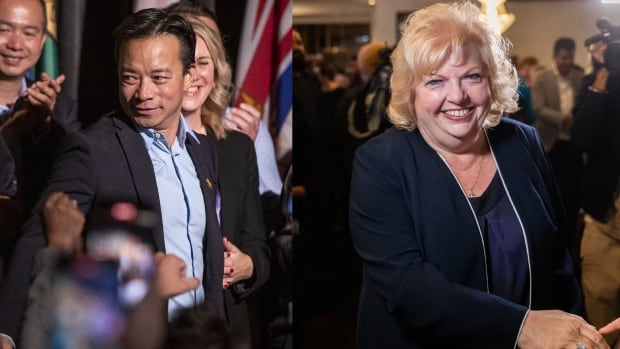A municipal election differs from a provincial or federal election in that there isn’t one party forming government but dozens of individual results and stories — in the case of B.C., 160 separate municipalities — happening everywhere all at once.
That being said, there is one major storyline: people wanting change.
People will focus on Vancouver and Surrey sweeping aside Kennedy Stewart and Doug McCallum, the leaders of B.C.’s two largest cities failing to win second terms.
But in Kelowna and Kamloops, West Vancouver and White Rock, Saanich and Langford, Penticton and Pouce Coupe, voters decided, as the adage goes, to “kick the bums out,” electing mayors with different perspectives on crime, housing, or ethics issues.
It’ll be a couple of days before we can say conclusively how many incumbents went down to defeat, though it will be more than the historical average.
But here’s what we can say for sure.
Crime and dysfunctional councils
There were two common themes of the people who went down to defeat.
One was a perception of being “soft on crime.” Stewart spent the entire Vancouver campaign attacked by other candidates for the state of the Downtown Eastside, and Stewart responded by accusing his rivals of “poor bashing” and saying, “The debate so far is like ‘who can arrest the most homeless people?'”
Whatever the merits of Stewart’s argument, it was the issue where he differed most from Sim — who said he supported the Vancouver Plan and the general tenants of the Broadway Plan — and he became the first mayor since 1980 to lose on election night.
Kamloops, Kelowna and many other municipalities also saw candidates win who promised to reverse the tide of crime in downtown cores, and now it will be their multi-jurisdictional challenge to try to solve over the next four years.
But more than that, a thing unifying losing candidates was a propensity that they couldn’t play well with others.
Stewart and Doug McCallum in Surrey were prominent examples of that, of course. But White Rock’s Darryl Walker and the City of Langley’s Val van den Broek, who frequently clashed with council, also went down to defeat.
Beyond Hope, many mayors that lost — Williams Lake, Trail, Pouce Coupe and beyond — all got in hot water with council for one reason or another and failed to keep the confidence of voters. Ben Isitt, who used to be both the most popular and controversial councillor in Victoria, went down to defeat.
And consider the case of Maple Ridge: Mike Morden was elected mayor four years ago on a platform of law and order and cleaning up downtown, and crime went down in his community over the last four years.
But his majority also clashed with councillors who didn’t agree with them, punished those who disagreed with them — and Morden went down to defeat, with Dan Ruimy and a team that downplayed crime and talked about consensus building coming to power.
What comes next?
In the weeks to come, a lot of attention will be placed on Surrey, where mayor-elect Brenda Locke has promised to reverse the transition to an independent police force and bring back the RCMP. Whether she succeeds will depend on a combination of provincial approval and her willingness to spend considerable political capital on something that will take a lot of time to pull back.
In Vancouver, the first steps of Ken Sim will also be scrutinized: while it’s clear he will push to change the 2023 budget to have more cops and nurses, what hires will he make in the mayor’s office?
Will any senior managers quickly be replaced? And will an olive branch be extended to the three surviving non-ABC councillors — Adriane Carr, Christine Boyle, and Pete Fry — on Metro Vancouver and internal committee appointments?
And outside Vancouver and Surrey, how will mayors deal with those same issues of crime and safety, rising house prices and split councils that doomed so many incumbents?
There’s nothing like the thrill of victory.
But new mayors will quickly learn that solving the problems they successfully critiqued might be easier said than done.


